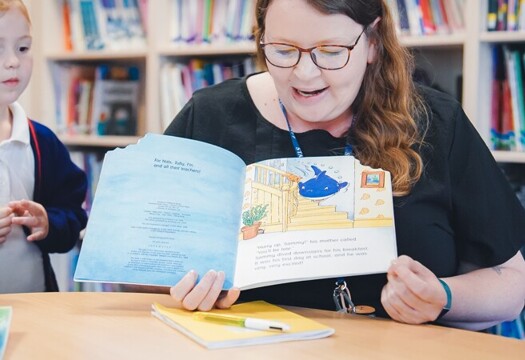- Home
- Curriculum
- By Subjects
- English
English
Intent
At Laburnum, we believe that a quality English curriculum should develop children’s love of reading, writing and discussion and will allow them to acquire the necessary knowledge, skills and understanding to become lifelong learners and linguists.
It is our intention to immerse pupils in the wonders of quality texts to instil a love for reading, a passion for discovery and a confidence to explore their imagination. We aim to inspire an appreciation of our rich and varied literary heritage and a habit of reading widely and often. We recognise the importance of nurturing a culture where children take pride in their writing, can write clearly and accurately and adapt their language and style for a range of contexts. It is our intention to broaden our pupils' exposure to high level vocabulary to allow pupils to apply their understanding of vocabulary and grammatical features within and across the English curriculum. We want to inspire children to be confident in the art of speaking and listening in order to express their emotions and ideas effectively.
We strive to teach the children how important their reading, writing, speaking and listening is in the real world both now and in their future; developing an awareness of the audience, purpose and context alongside an increasing knowledge of vocabulary and grammar.
We believe that children need to develop a secure knowledge-base in English, which follows a clear pathway of progression as they advance through the primary curriculum. As English underpins all other areas, the children will be provided with good quality reading and writing opportunities across the curriculum also. A secure basis in English skills is crucial to a high quality education and will give our children the tools they need to participate fully as members of society.
Implementation
Phonics Scheme
In all year groups, we use the Sounds Write scheme and approach to teaching reading and spelling. This is complemented with books from the Sounds-Write scheme in Early Years, Key Stage 1 and for pupils in Key Stage 2 where these are still required. There are four main concepts that the children learn through the Sounds Write programme:
letters are symbols that represent sounds.
sounds can be spelled using 1, 2, 3 or 4 letters.
the same sound can be spelled in different ways.
the same spelling can represent different sounds.
Through a mixture of segmenting, blending and phoneme manipulation lessons, the children learn the code knowledge and apply it in whole words from the very beginning. With a focus on what the children can hear, all children can participate.
All pupils take home a Sounds-Write scheme reading book aligned to the phonic code that they know to practice decoding and build towards fluency and automaticity.
In Years 4-6, the children continue to use the Sounds Write approach to support them with spelling, building on the work they have already done and extending this to polysyllabic words.
Vocabulary: Vocabulary is a focus in every subject. New vocabulary is explicitly taught and reviewed and is displayed on working walls, which are added to as new vocabulary is acquired. We value vocabulary development and ensure that children are encountering good quality vocabulary across the curriculum. All subject plans have core vocabulary highlighted.
Reading: Children have a phonetically decodable reading book from Reception class when they can successfully blend and segment. At Yellow level, the children will then choose a second book from the school reading scheme. Depending on the child’s confidence and fluency, the children may keep a phonetically decodable book or may move across to the reading scheme. Those children who are receiving phonics intervention, will also have a phonetically decodable book linked to their phonic level. Free readers have a Reading Journal to record thoughts, opinions, questions, character and plot information about the books they have read-one page per text. Children who do not read regularly at home are targeted to read with our reading volunteers. Our Reading curriculum is based on CLPE. Each class has a book per term which is a focus for Reading lessons and acquiring key skills.
Writing: Our aim is for all children to reach automaticity when using grammar and punctuation in order to reduce the cognitive load when they are composing independent writing. Therefore, children are taught writing as a discrete subject. They learn to use specific sentence structures and heavily modelled scaffolds to secure them before having the opportunity to apply their skills to writing tasks based on previous reading or foundation subject knowledge.
Speaking and Listening: Oracy is supported by the introduction and rehearsal of key vocabulary, drama and discussion opportunities and the use of sentence stems across the curriculum.
For further details please see planning and progression document.
